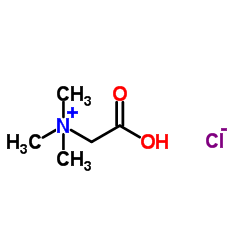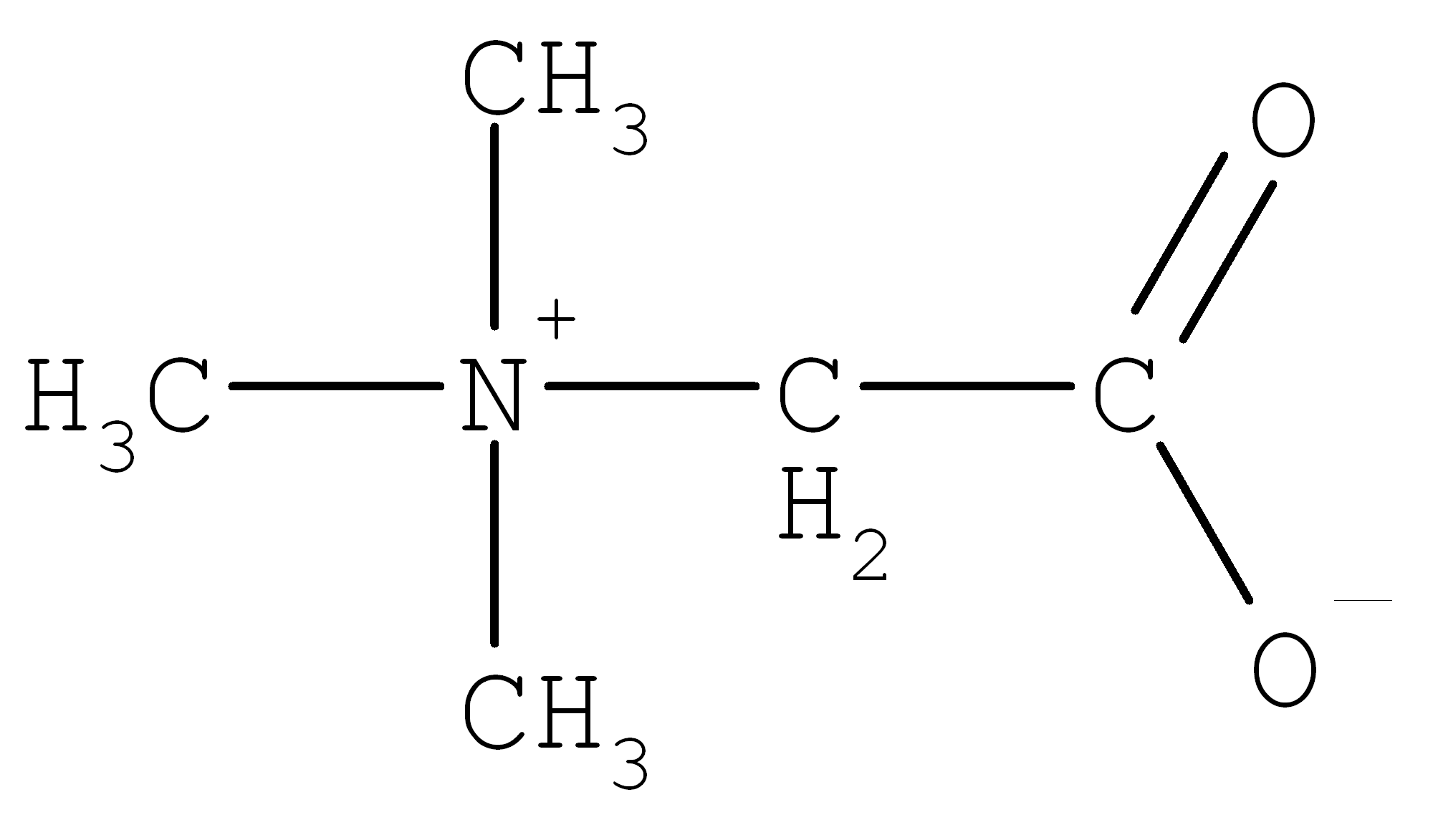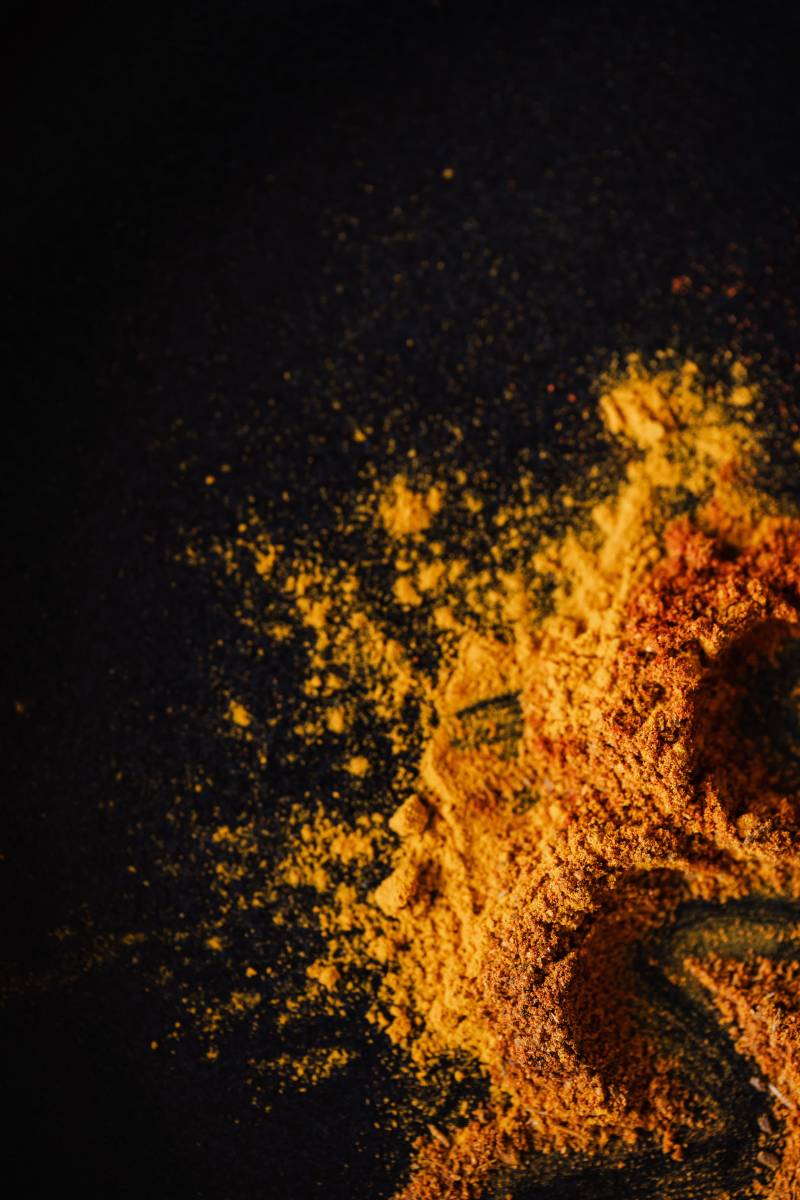Betaine hydrochloride (Betaine HCl) is an acidic form of betaine, a vitamin-like substance.

Chemistry of Betaine HCl
Chemical Name: Betaine hydrochloride, Hydrochloride of Betaine, Betaine HCL and pluchine.
IUPAC Name: 1-carboxy-N,N,N-trimethylmethanaminium chloride
Molecular Formula: C5H12ClNO2
Molecular Weight: 117.15 Daltons
Chemical Properties: Colorless to white crystals. Betaine is water soluble and has sweet taste.
Sources: Different foods such as sugar beets, grains and spinach.
Uses
1. Betaine HCl acts as an osmoprotective agent and a methyl group donor in metabolic pathways thus partially replacing methionine and choline in the diet.
2. Direct supply of HCl to stomach: Betaine HCl is used as gastric acidifier. Some patients with hypochlorhydria have used Betaine HCl alone, or in combination with pepsin. Betaine HCl acts a digestive aid for people suffering from insufficient levels of gastric acid in their stomachs. Insufficiency of gastric acid may be caused by poor nutrition, dehydration, stress, in perimenopausal women, or with just old age.
3. Role in protein digestion: Betaine HCl raises the levels of hydrochloric acid in the stomach which is required for breakdown of proteins into peptides and amino acids under the action of enzyme pepsin. Pepsinogen HCl Pepsin.
4. Role in lipid metabolism: Betaine prevents from accumulation of ‘FAT’ in liver by participating in lipid metabolism.
5. Lowers levels of homocysteine in blood: Betaine HCl is converted into Betaine in the ‘Alkaline’ environment of intestine. Betaine is absorbed in the blood via the enterocytes in the intestines and then reaches the liver through portal circulation; where it is metabolized.
The principal metabolic reaction - Transfer of methyl group from betaine to homocysteine via enzyme Betaine-homocysteine methyltransferase and the end products being L-methionine and dimethylglycine. Betaine helps to lower homocysteine levels in some patients with primary hyperhomocyteinaemia / homocystinuria.
6. Role of ‘Glycine’ - part of Betaine HCl:
Role in muscle building: Betaine has a component of methyl and glycine. This glycine is converted in body which is important for building up of muscles, thus good for both body builders and athletes. It also improves and supports the vitality and vigor of heart muscles.
Role in sugar metabolism: According to the American Journal of Clinical Nutrition 2002, glycine is known to potentize insulin and can facilitate removal of glucose from blood, thus acting as an important biochemical.
Glycine is an important component of collagen which is the key ingredient of bone and also an important part of skin and other connective tissue. Glycine via collagen strengthens the veins and arteries, bones and skin.
7. Role in protection of liver:
Betaine protects liver against hepatotoxins, ethanol and carbon tetrachloride.
Its action is mediated by S-adenosylmethionine (SAMe) [SAMe promotes liver health, and plays a role in the formation of phospholipids which is vital for formation and functioning of normal cell membrane].
Also the hepatoprotective activity of betaine is due to its lipotropic activities and osmolyte activity (Betaine is an intracellular osmolyte in kupffer cells and sinusoidal cells of liver.)
Role of Betaine HCl in treatment of Achlorhydria and Hypochlorhydria
HCl has a key role in the digestion and absorption of wide range of nutrients - proteins carbohydrates and fats, vitamins and minerals, it also provides protection from pathogens. It is vital for metabolizing and absorbing food, and for assimilation of proteins, Vitamin B12, calcium and iron.
With aging, the body naturally produces less digestive enzymes, and thus there is not only decrease in hydrochloric acid production but also other enzymes. This leads to sluggish digestion and poor nutrient absorption. Low stomach acidity is associated with rapid invasion of the colonic microorganisms, forming gastric and intestinal bacterial colonization and overgrowth.
Common digestive problems - Achlorhydria: the complete absence of stomach acid & Hypochlorhydria: low stomach acid.
Symptoms of Hypochlorhydria occur several hours after eating and includes a desire to eat when not hungry, a sense of fullness after meals, flatulence, bloating, constipation and diarrhea. Symptoms of low stomach acid also include heartburn, indigestion and bloating
Lack of stomach acid can cause indigestion, malabsorption (leading to various deficiencies), bloating and degenerative diseases, acute and chronic infections and even cancer.
The deficiency can be treated with a simple hydrochloric acid supplements.
Role of Betaine HCl in treatment of GERD, Hyperacidity, and Heartburn
Millions of people around the world are on acid suppressing drugs, which fail to treat the symptoms of heartburn, hyperacidity and GERD, which can be cured by taking Betaine HCl. Hypochlorhydria, may also be induced due to repeated intake of acid reducing agents like PIP or H2 inhibitors, which are commonly used in GERD, Acid Peptic Disorder. Thus from a pharmacological perspective, patients on regular prescription of PIP or H2 inhibitors are known to have increased levels of gastric pH and may require an oral dose of Betaine HCl later.
Also, research says that heartburn and GERD are mostly always caused by a LACK of gastric acid, and not by overproduction, and thus a prescribed supplementation of oral Betaine HCl is helpful.
Role in treatment of Allergies and Sensitivities and Food Allergies
HCl helps in digestion of proteins, and thus may theoretically help in breakdown of food allergens into smaller non allergic molecules.
Role in treatment of Gall Stones
It is noticed that patients having gall stones usually have low or insufficient stomach acid and they may benefit from use of Betaine HCl supplementation. Betaine improves Restriction Digestion
It enhances restriction digestion of DNA molecules even in those which are resistant to digestion in spite of the existence of recognition sites.
Other conditions for which Betaine HCL may help includes
1. Acne and skin disorders: Low stomach acid affects absorption of nutrients specially Vitamin B complex, thus its supplements along with Vitamin B complex may improve acne and other skin disorders. Hydrochloric acid supplements results in gradual regimentation of the skin in some patients with vitiligo after a year or more of consumption of HCl.
2. Iron-deficiency Anemia: Absorption of iron from diet requires HCl and hence its deficiency may lead to iron deficiency anemia.
3. Candida & Yeast Infections: We are aware that stomach acid acts as defense mechanism or a barrier against various infections including yeast and candida. It inhibits the overgrowth of candida and prevents it from being established in the small intestine.
4. Arteriosclerosis (hardening / loss of elasticity in the arteries): by lowering of homocysteine levels in blood and urine.
5. Osteoporosis: Betaine HCl helps in absorption of calcium.
6. Gastroesophageal reflux disease (GERD).
7. General malabsorption of nutrients.
8. General indigestion and heart burn.
Effect of chronic use of drugs like acid neutralizers and acid suppressers (proton pump inhibitors and H2 blockers)
1. Acid Neutralizers: They damage the stomach the least as they supply Mg, Ca, Aluminum or sodium salts which neutralizes the acid in stomach. These effects are temporary and the HCl levels revert to normal after their effect is over.
2. Acid Suppressors: They are of two types,
Histamine receptor blocker or H2 Blocker: Hormone Gastrin stimulates Gastric Histamine Receptors stimulates Parietal Cells produces HCl.
But these drugs prevent the production of HCl by blocking the receptors and producing a state of hypochlorhydria for hours. The drugs in this class include Rantac, Zantac etc
Proton Pump Inhibitors (PIP): Proton Pump Mechanism is used by the gastric cells to move the HCl into the stomach.
This mechanism is blocked by PIP and creating a very serious state of Achlorhydria which exists for an entire day.
Studies have shown that increased gastric pH after chronic use of acid reducing agents, impacts absorption of nutrients from the stomach. Further gastric re acidification with Betaine HCl showed lowering of gastric from pH 5 to pH 1 for more than an hour and also significantly improved absorption of drugs.
Investigation
The symptoms of both over and under production of stomach acid (hydrochloric acid) are identical rather same and hence misdiagnosis is very common. Thus it is unwise to jump to a conclusion without testing.
1. The Heidelberg Capsule Test: In this test the patient is asked to swallow a small vitamin sized electronic device which tracks the levels of acid in the stomach. Then the acid is neutralized using baking soda, if the acid level does not return to normal after consuming baking soda the patient has ‘hypochlorhydria’
2. If the above test is unavailable, then a low tech method is used where - Betaine HCl is used as challenge substance, when eating, to see if digestive function improves with the use.
Side effects
Large doses of Betaine HCl may corrode or damage the mucus lining of stomach. Thus if burning sensation is experienced it must be discontinued immediately. It may cause heartburn.
In the patients with history of gastritis, Peptic ulcers or gastrointestinal symptoms like heart burn must not be prescribed with Betaine HCl or may be given with proper observation and care.
Special Precautions
1. Pregnancy and breast-feeding: Enough doses are not known about its use during pregnancy and breast-feeding. On the safer side one should avoid its use.
2. Peptic ulcer disease: Betaine HCl supplies HCl to stomach so it may irritate the ulcers and may prevent them from healing.
3. Betaine HCl should never be prescribed along with kind of anti-inflammatory medications such as corticosteroids, aspirin, ibuprofen, or other NSAIDS. As these drugs my initiate damage to the mucus lining of the Gastro intestinal tract which may be aggravated with HCl and increasing the risk of ulcer and gastric bleeding
4. It is contraindicated in those patients who are hypersensitive to any component of a Betaine - or Betaine HCl.
Dosage
The appropriate dose depends on various factors including Age, health status or other medical condition, and other medications which the patients are on.
Also Betaine HCl should be given along with other digestive enzymes to aid digestion.
References:
- Huntington College of Health Sciences •8002904226 •www.hchs.edu: Using Betaine Hydrochloride & Digestive Enzymes for Indigestion- 2014 Huntington College of Health Sciences
- http://www.uofmhealth.org/health-library/hn-2808009#hn-2808009-how-it-works
- http://www.ncbi.nlm.nih.gov/pubmed/16216219
- http://sootheandheal.blogspot.in/2013/01/why-stomach-acid-is-good-for-you.html
- http://draxe.com/what-is-betaine/
- Dr. Jonathan Wright’s book, Why Stomach Acid is Good for You,
- http://scdlifestyle.com/2013/10/4-common-betaine-hcl-mistakes/
- http://www.webmd.com/vitamins-supplements/ingredientmono-312-betaine%20hydrochloride.aspx?activeingredientid=312&activeingredientname=betaine%20hydrochloride
- http://www.modernherbalist.com/betaine.html
- Using Betaine Hydrochloride & Digestive Enzymes for Indigestion by Gene Bruno, MS, MHS (Dean of Academics, Huntington College of Health Sciences)
- 11. http://www.austincc.edu/mlt/ua/ualab14gastricanalysis.pdf
- http://www.fit2play.com/wp-content/uploads/2013/09/Stom-acid-.pdf : WHY STOMACH ACID IS ESSENTIALFFOR OUR HEALTH August- September’2012 by Elaine Hollingsworth 2000–2012 Extracted and edited from chapter 3 of her book Take Control of Your Health and Escape the Sickness Industry Website: http://www.doctorsaredangerous.com
- http://anabolicminds.com/forum/supplements/66469-betaine-betaine-hydrochloride.html
- www.greatvistachemicals.com/industrial_and_specialty_chemicals/betaine_hydrochloride.html
- http://chriskresser.com/how-your-antacid-drug-is-making-you-sick-part-b/
- https://chriskresser.com/how-your-antacid-drug-is-making-you-sick-part-a/
- http://articles.mercola.com/sites/articles/archive/2009/09/05/why-you-should-get-off- prescription-acid-reducing-drugs-asap.aspx
- http://www.ncbi.nlm.nih.gov/pmc/articles/PMC3946491/



